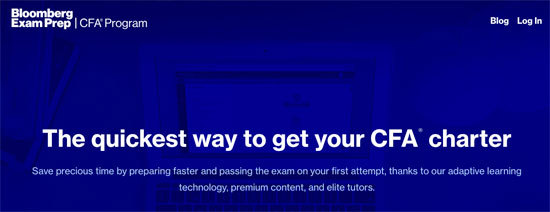Passing the CFA exam and becoming a CFA charterholder requires passing three exams which each require an average of 320 hours of studying. The first two exams historically have pass rates in the mid 40’s and 1 out of every 5 people who takes level I makes it through all 3 levels of the exam.
With such a daunting challenge, the question becomes is it worth it to become a CFA charterholder? The short answer is that it depends. It depends on your age, career goals, and your ability to manage your personal life.
This article will take you through my decision to become a CFA charterholder and explain what situations it makes sense to pursue the CFA charter and when it might not make sense.
- Try out Wiley’s CFA exam practice question test bank for free.
Why I Chose to Become a CFA Charterholder
I graduated college during a recession. If I had graduated just one year before, I could have joined many of my other friends that were offered entry level financial analyst jobs in New York City with signing bonuses to boot.
Unfortunately, when I graduated most of those jobs temporarily cut back their positions. The few financial analyst positions available were unbelievably competitive just to earn an interview. Let alone actually get a job offer.
Finally Landing a Job
It took me two months after graduating, but I was able to land a phone center job at a large mutual fund company. This wasn’t the job I originally wanted, but it was a job and it was in the industry that I wanted to be in.
The most important thing I did was to network with as many people as possible. During this time, I discovered the CFA program. After researching the requirements, I knew this was the best move for me to make if I wanted a shot at getting in to the investment management side of the business.
How I Prepared for the Exam
I signed up to take the June exam and started studying in November. I used the Wiley CFA exam review course because it offered a large database of multiple choice practice questions. There are a variety of other good prep course options including Adapt Prep, Schweser, Bloomberg, and Analyst Prep.
The most valuable part of my studying was using CFA exam practice questions from a test bank. When I ran into difficult topics, I used the original CFA textbooks as a reference.
However, I just never found it practical to read the textbooks from cover to cover because the original material spans over 1,000 pages. I kept a list of challenging topics and would use the textbooks to review those topics in depth.
Because I had just graduated from college, I had no real commitments. I also had the time, energy, and motivation required to study the material during the evenings and weekends. This included taking full length CFA mock exams once or twice each month.
Being naturally interested in the material also made it much easier to study.
If I was taking the exam when I was ten years older with family commitments, studying for the exam would have been a dramatically different situation.
Looking back on that time period, I’m not sure how I managed to find the time to study, because I don’t believe I could find the time to study for those tests if I had to do it all over again today.
- Wiley CFA Review Course Free Trial.
Benefits of Taking the CFA Exam
I can’t prove it, but when I passed the first level of the CFA exam, I started to get more interviews. You can put your candidate status on your resume even if you haven’t yet passed all three levels of the CFA exam.
I strongly believe that by including my status as a CFA level II candidate, it made a big difference in how frequently I received interviews.
Eventually I landed a position in corporate banking as a credit analyst. While my status as a CFA candidate wasn’t a deciding factor in my job offer, I do believe it helped me stand out.
The CFA charter didn’t directly result in a large salary increase. However, the material I learned on the CFA exam, particularly accounting, helped me excel in my job. My strong job performance directly contributed to future promotions and salary increases.
For more information about salaries, see our article about average CFA salaries.
Was it Worth it for me?
So, when I look back and think about whether the CFA exam was worth it for me, the answer is an unequivocal yes.
Some of my reasons are unique. If the job market was stronger when I graduated, it’s possible I would not have had the motivation to study for all three levels of the exam, especially if I was offered a good job right out of school.
If I happened to be 5 or 10 years older, it may have been more difficult to find the time to study. Especially if I was already working at a good job.
Situations When the CFA Charter is Worth it
Every person’s situation is unique. The first question you need to ask yourself is will I have the time required to study.
This is particularly important because you are most likely going to be working in a full time job while studying for the exam.
You Graduated in a Weak Job Market
Many people through no fault of their own end up graduating in a bad job market. You might have aspirations of getting into wealth management or investment management, only to find out the large employers in those industries aren’t hiring right now.
Rather than getting an opportunity in your preferred job or even preferred industry, you land in a support role that requires some creative maneuvering to make a move into a better job.
Pursuing the CFA charter makes a lot of sense for someone in this situation. You have a number of factors in your favor that will help you get through the exam.
If you’re still in your early 20’s you’re more likely to have the time and stamina necessary to master the material. Probably more importantly, you will have the motivation to pass due to your desire to move up to a better job.
Earning the CFA Charter is a Job Requirement
Some people may already work in the investment management industry and find that earning the CFA charter is a formal or informal requirement of getting the next promotion.
You may not have as much time to study as when you just graduated college, but the desire to get the next promotion will provide the motivation you need to pass the exams.
If you find yourself in a scenario where the CFA charter is a requirement of the job, it makes sense to pursue the charter unless you plan to get out of the industry.
Situations Where the CFA may not be Worth it
It doesn’t always make sense for everyone to pursue the CFA exam.
Spending a significant amount of time studying for an exam that you don’t finish can be demoralizing.
Making a Career Change
If you’re not currently working in the financial services industry and you’re considering making a career change, you need to think very carefully before pursuing the CFA charter.
Breaking into a non-sales role in the financial services industry from a different industry can be a real challenge.
It might be possible to get some attention and increase your chances of getting hired if you were to pass the CFA exam while working in a different industry.
However, you have to also consider the possibility that you might not be able to get your foot in the door even if you do pass all three levels of the exam.
If you’re contemplating a career change into financial services, I think you might have a better chance of making that change if you pursue an MBA from a top school. An MBA might give you better networking advantages than the completing a self-study program like the CFA exam.
Limited Personal Time
Most people have to study for the CFA exam while working full time. If you have young kids or other family situations that will make studying for the exam a challenge, you may need to hold off before moving forward with the CFA charter.
You can always wait to start studying until you have a little more free time. If you’re juggling too many personal responsibilities, you can find yourself burned out and risk failing the exam.
How to Start Preparing to Earn the CFA Charter
After deciding you’re ready to start preparing for the CFA exam, you need to select a high quality review course. We have prepared a detailed guide highlighting the best CFA exam review courses.
We also recommend starting with a practice test bank to find out your starting skill level before studying. Adapt Prep offers a comprehensive online test bank.
- Try out Wiley’s CFA Test Bank for Free.



